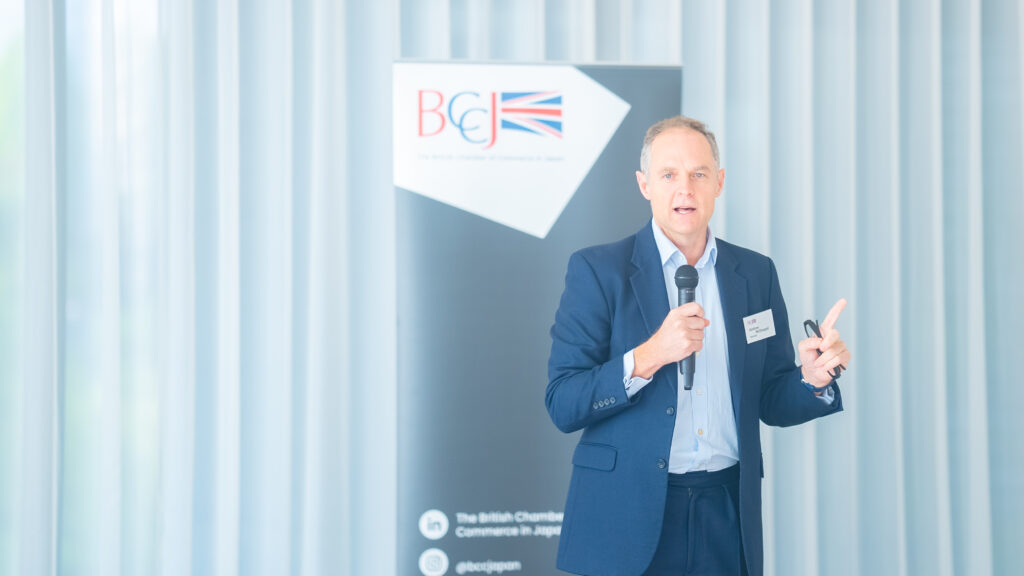Member? Please login
Future of Work: mental health and wellbeing

Written by Sterling Content
July 9, 2021
Past Event Round Ups
The British Chamber of Commerce in Japan launched its new event series, Future of Work: Building Back Better, with a webinar about the pandemic and mental health, on June 29. The expert panellists explored how and why Covid-19 continues to impact everyone’s wellbeing and what can be done to foster healthier, happier people and workplaces in the post-pandemic era.
Vickie Skorji, director of TELL Lifeline, began by exploring the mental health landscape before the outbreak of the novel coronavirus. Globally, one in five employed people had a mental health issue. In Japan, 61% of workers reported experiencing “strong feelings” of anxiety and stress at work in 2015, according to the Ministry of Health, Labour and Welfare. However, in research conducted by the London School of Economics, staff in Japan said they were less likely to tell their employer about their mental health issues for fear of losing their job.
In short, explained Skorji, before the pandemic there were serious shortcomings in addressing mental health, as well as an increasing number of people experiencing mental health issues.
Covid-19 and mental health
Although the pandemic is different from other disasters the world has faced in modern times, its impact has been similar. It forced dramatic change on people’s environments, triggering stress that, if left unchecked, can lead to anxiety and depression.
The more someone is impacted by Covid-19, the more likely they are to experience a “traumatic stress response,” she said. Furthermore, 15–20% of people develop ongoing mental health problems in the 12–24 months following a disaster. As the world has not yet exited the Covid-19 disaster, it is likely that mental health issues will continue to rise as the world comes out of the pandemic.
In 2020, almost 80% of 12,000 employees in 11 countries said the pandemic had affected their mental health, according to a study by Oracle and Workplace Intelligence. Younger age groups and women were more likely to say their mental health had been affected, thought to be caused by greater disruption to employment, education and childcare.
In 2021, Skorji noted that many people are feeling burnout from the ongoing strain of coping with pandemic-induced change. As people plan for the future and look to get society moving again, it is important to remember that everyone is a physical being.
Everyone is being affected by pandemic-induced stresses that can make us fatigued, she added, so we should have “honest conversations” with ourselves and others. Some people will be feeling the strain more, depending on how the pandemic has affected their personal circumstances, and 30% of people who had Covid-19 will experience ongoing mental health issues.
Employers and leaders
Fellow panellist Karin Wellbrock, partner and COO at Kay Group, said that the pandemic-induced acceleration of telework has greatly challenged how we work. Given the corporate setup in Japan, it wasn’t easy for many people to switch to telework.
The change has instigated a new understanding of the critical roles required to keep organisations running. For example, in order to maintain smooth business operations in 2020, staff went to the office to stamp hanko seals—what was thought to be non-critical work pre-pandemic. She expects assessing work in terms of what is critical and what requires people to be together physically will be top of mind as firms consider how to build back better.
“We can redesign what we do face-to-face and what we do remotely,” she said, adding that “brainstorming, decision-making and strategy sessions” are likely to be preferred face-to-face. “We have an opportunity to reshape the culture for bringing people together for focused, insightful work.”
The role of the employer has also changed and expanded due to new needs. She said organisations need to become more explicit in being a “social network” by providing “financial support as well as physical and mental safety.” This could be challenging, she added, as it requires skills and resources that organisations may not have.
Wellbrock said leadership styles in Japan might have been a contributing factor to mental health issues across the country pre-Covid. According to research by global management consulting firm Hay Group, leaders in Japan inherently possess fewer of the six recognised leadership styles compared to global peers (two versus five, respectively), suggesting they might not be equipped to lead a remote workforce or lead in times of uncertainty. Organisations should be prepared to expand their leadership competencies to meet the needs of organisations and employees today.
“The CEO attributes—having vision, financial acumen, focus, drive, and being sharp as a knife—are no longer sufficient. We’re now looking for leaders who are connectors in chief, with authenticity, agility and curiosity to engage and provide an environment where people can find a voice,” she said. “Post-pandemic, organisations will be much more human-centric.”
Supporting staff
While firms are considering a return to some normalcy, employees are seeking clarity on their future, said Skorji, pointing to a March 2021 McKinsey survey showing 47% of staff don’t know what their employer wants from them post-pandemic. Half said they sought a more flexible post-Covid work model and 30% said they would quit if they were forced back to the office full-time.
Despite people missing human connections with each other during the past 18 months, the study also shows 68% of people would prefer to talk to an app or AI rather than their manager about their mental health issues.
She advised organisations to take recovery in stages and have dialogue with staff on work post-Covid. As employees lost the ability to make choices with the outbreak of the novel coronavirus, it is important that they are heard.
Redesigning organisations is also key to building a system that supports everyone’s mental health at work, according to Wellbrock. Leaders should focus on improving communication, defining the principles of how people should work and investing in people.
“If staff should come to the office, give them the reason,” she said. “This is a time to rethink your values as an organisation and how you want them expressed. Develop leaders who are more versatile, accepting of different opinions and better in challenges … A single person cannot solve problems anymore.”
She suggested firms avoid making assumptions, but instead find out first-hand what infrastructure and support is required for staff to work. When considering needs, they might also need to balance when to create a policy and when to respond on an individual basis.
Management can also lead in opening up discussions about mental health at work, said Skorji, pointing out that “we’ve all felt the stress of Covid and can be more honest about that.” Options include introducing the topic by discussing stress at work, giving training on mental health to managers and making it acceptable for people to access help such as employee assistance programmes.
“It’s important the company sets the scene. Let’s make [employee assistance programmes] a service that is supporting rather than shameful,” she said, adding that it should be offered in a separate, appropriate environment. “We would readily go to a doctor for a physical health problem, why can’t we go and get support for something that is happening in our mind.”
Providing a work environment that fosters wellbeing could become a key part of the employer value proposition in the post-Covid world, said moderator Joshua Bryan, director of financial services, legal, HR and support at Robert Walters Japan. According to a survey by his employer, one fifth of some 700 employees surveyed in Japan want to know if employers offer mental health services before accepting a job offer.
Robert Walters Japan’s employee assistance programme, which is provided by TELL Japan, allows staff to receive counselling services with confidence because they are provided in “an anonymous, safe and accessible format,” he said.
Wellbrock added that, sooner or later, offering mental health support could become mainstream for organisations.
Creating better environments
In closing, Skorji said the pandemic has reinforced the reality that everyone has mental health as well as physical health. Looking ahead, she said “we can become more mindful and rethink mental health” to allow people to be creative, prosperous and motivated.
Wellbrock encouraged attendees not to dream of “going back to the old days” but to see the opportunities now to “build a better version of the workplace,” for organisations and their people.







